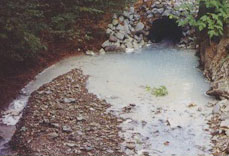Bill encourages drillers to use abandoned mine drainage to frack by easing liability
-
Katie Colaneri

Courtesy of the Western Pennsylvania Coalition for Acid Mine Reclamation
Acid mine drainage often turns a stream orange and smothers all aquatic life. In this case, aluminum has turned the stream lifeless.
After shrinking away from the spotlight for almost eight months, a bill aimed at encouraging natural gas drillers to use polluted mine drainage water to frack by easing their liability is making its way back into the legislature.
Senate Bill 411 got a lot of attention earlier this year when environmentalists pushed back, claiming it would grant immunity to the industry all the way through the fracking process. The bill, introduced by Sen. Richard Kasunic (D) from Somerset and Fayette counties, was tabled in March, but was amended in mid-November and has now been referred to the Senate Appropriations Committee to the surprise of environmental groups closely following the issue.
The state wants natural gas drillers to use this polluted water over fresh water sources. It takes about four million gallons of water to frack just one well. Some drilling companies like Seneca Resources are already doing this, but others worried the state’s Clean Streams Law would make them responsible for cleaning up these streams in perpetuity.
“This bill would make it clear that a natural gas producer who uses that water to develop an unconventional natural gas well is not going to incur liability for the treatment of the original source of that water,” said attorney Peter Fontaine.
Fontaine, who works for a Philadelphia firm that is a member of the industry trade group the Marcellus Shale Coalition, said natural gas producers would likely still be held responsible for any mishandling of the water.
But environmental groups argue the bill would still grant full immunity to drillers without fixing the multi-billion dollar abandoned mine drainage problem.
“It would grant immunity to a company that comes in, pumps the water out and sells it for use, for example, in fracking activities,” said Jordan Yeager, an attorney working with environmental groups who oppose the bill. “It would grant immunity to that company even though that company isn’t doing anything to clean up the water.”
The bill would amend the Environmental Good Samaritan Act that protects volunteer watershed groups working to clean up some 5,000 lifeless streams contaminated by coal mining. Yeager says withdrawing the water and moving it off site should not count as cleaning streams.
Tracy Carluccio with the Delaware Riverkeeper Network argues the bill would also give those who buy the water full immunity, though the amended version makes that point less explicitly than the original bill.
“We know it does extend immunity to water withdrawal and we know it leaves open the door that the end user could be immune,” Carluccio said, noting that drillers could use the legislation to avoid taking responsibility from harm that could come from over-withdrawal of these streams.
Other watershed groups have supported efforts to encourage drillers to use abandoned mine drainage to frack, looking to the industry to help fund the continuous cleanup.
















